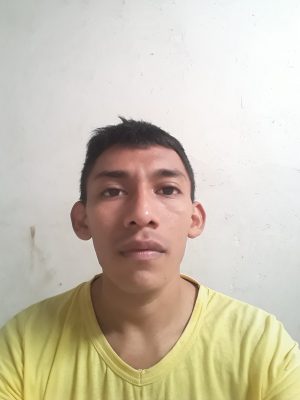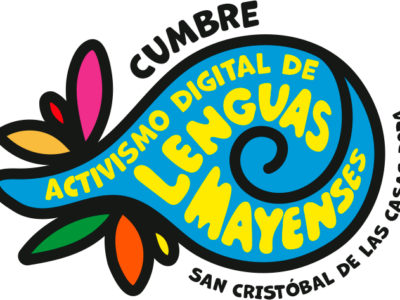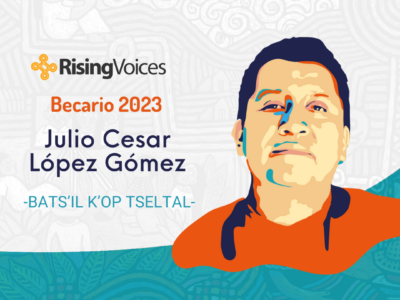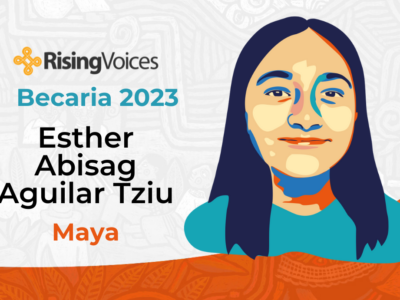
Foto proporcionada por Photo provided by Leonardi Fernández
Rising Voices (RV): Please tell us about yourself.
¡Saludos! Me llamo Leonardi Fernández del pueblo wayuu, nación indígena que existe entre Colombia y Venezuela. Actualmente vivo en Süchimma (Riohacha), capital del departamento de la Guajira colombiana. Comencé hace varios años junto al compañero Carlos Colina de Wikimedia Venezuela, el desarrollo de una wikipedia en el idioma de mi pueblo, proyecto que marcho bien hasta que las condiciones políticas del país fueron complicándose cada vez más en Venezuela. Teniendo que dejar mi país y paralizar mis estudios de Antropología Social y Cultural. Sin embargo no me he desligado del proyecto, porque se han sumado personas y colaboradores como Neima Paz y Yendry Ugas, grandes amigos que han colaborado con gran interés con miras a desarrollar la wikipedia y promocionarla entre la misma sociedad wayuu. Se han hecho talleres en la ciudad de Maracaibo y se planifica presentar en Riohacha, Colombia el proyecto ante educadores, docente y estudiantes. Los talles han contado con la colaboración del lingüista José Álvarez, gran estudioso de la lengua guajira quien además participo en una charla, todo ello con el mismo fin de ver terminado el proyecto y avanzar.
Greetings! My name is Leonardi Fernández from the Wayuu people, an indigenous nation that exists in Colombia and Venezuela. I currently live in Süchimma (Riohacha), capital of the department of Guajira in Colombia. Several years ago with Carlos Colina of Wikimedia Venezuela, I started to develop a Wikipedia in the language of my people, a project that went well until the political conditions of the country became increasingly complicated in Venezuela. I had to leave my country and suspend my studies in Social and Cultural Anthropology. However, I have not detached myself from the project because new collaborators have joined such as Neima Paz and Yendry Ugas, who are great friends and have collaborated with great interest with a view to developing the Wikipedia and promoting it among Wayuu society. Workshops have been held in the city of Maracaibo and we are planning to present the project to educators, teachers, and students in Riohacha, Colombia. The workshops have included the collaboration of linguist José Álvarez, a great student of the language who also gave a talk, all with the same purpose of seeing the project finished and moving forward.
RV: What is the current status of your language on the internet and offline?
La lengua wayuu es una de las lenguas más estudiadas en Colombia y Venezuela, con un buen material bibliográfico al cual se puede acceder gracias a los aportes de lingüistas y maestros wayuu como Ramón Paz Ipuana, Miguel Angel Jusayu entre otros. Es una lengua viva que se mantiene en uso constante a pesar de sus cambios y apropiaciones de palabras de la lengua dominante, se mantiene por diversas razones y condiciones propias de la vida cultural de los wayuus. Sin embargo ha habido fuertes influencias en la parte tecnológica y pedagógica que cesan o excluyen el uso constante de la lengua wayuunaiki y colocan por encima otras lenguas, es por ello que se crean los institutos etnoeducativos y bilingües donde se da el uso de ambas lenguas, más sin embargo aun faltan planes y acciones contundentes que hagan de la lengua materna la vía principal de comunicación aun en situaciones de la vida laboral, educativa y cotidiana. La incursión del wayuunaiki o de cualquier otra lengua indígena en internet sería un paso más de su resistencia al no dejarse arropar y existir a pesar de la coexistencia en el sistema Estado-Nación que se apodero de los territorios indígenas y va también por educarlos bajo la concepción de escolaridad y de servicio al sistema laboral en algunos casos reprimiendo y restando importancia a los modos de vidas indígenas al colocarlos en la categoría de folklor, tradición o minorías. El wayuunaiki como tal tiene presencia en internet ya sea en monografías digitalizadas, diccionarios digitales, blogs, resúmenes, estudios lingüísticos y traductores, todos desarrollados para diferente propósitos. Con respecto a wikipedia en wayuunaiki siendo esta una enciclopedia supone un gran paso hacia la apropiación de la herramienta tecnológica y digital por parte del pueblo wayuu, sobre todo para la generación que crece bajo el ambiente escolar multicultural y bilingüe, quienes pueden darle un uso constante con supervisión y recomendación de los institutos educativos y demás entes involucrados, ya que se busca es darle uso a la herramienta e ir perfeccionándola.
The Wayuu language is one of the most studied languages in Colombia and Venezuela, with good bibliographic material which can be accessed thanks to the contributions of Wayuu linguists and teachers such as Ramón Paz Ipuana, Miguel Angel Jusayu, among others. It is a living language that remains in constant use despite changes and word appropriations from the dominant language. It is maintained for various reasons and conditions of the cultural life of the Wayuus. However, there have been strong influences in the technological and pedagogical part that has caused or excluded the constant use of the Wayuunaiki language in preference of other languages. That is why the ethno-educational and bilingual institutes were created where both languages are used. However, plans and forceful actions are still lacking that would help make the mother tongue the main means of communication in situations of work, education, and daily life. The incursion of the Wayuunaiki language or any other indigenous language on the Internet would be another step of their resistance to not allow themselves to be covered up and exist in spite of the coexistence in the Nation-State system that has taken over indigenous territories, educating them under the concept of schooling and service to the labor system, and in some cases repressing and diminishing the importance of indigenous ways of life by placing them in the category of folklore, traditional or minorities. The Wayuunaiki language has a presence on the Internet either in digitalized monographs, digital dictionaries, blogs, summaries, linguistic studies, and translators, all developed for different purposes. With respect to Wikipedia in Wayuunaiki, this encyclopedia is a great step towards the appropriation of technological and digital tools by the Wayuu people, especially for the generation that grows up under the multicultural and bilingual school environment, who can constantly use it with supervision and recommendation of the educational institutes and other entities involved, since the aim is to use the tool and improve it.
RV: On what topics do you plan to focus during the week that you’ll manage the @ActLenguas Twitter account?
Mi plan es enfocarme en la promoción de wikipedia en wayuunaiki, en un diccionario de wikipedia y en la importancia del uso de la lengua en la juventud o la generación actual, además de los retos de nuestros ancianos en mantener la lengua viva y como esta se convierte en el vehículo para transmitir la cosmovisión de un pueblo. Compartiré evidencia fotográfica de los talleres y lo que se ha hecho en relación a wikipedia en wayuunaiki en Venezuela. Y los planes que existen para seguir presentando y haciendo notar el wayuunaiki en relación al activismo digital. Se tratará de generar conciencia sobre la importancia de la lengua materna y presentaré a los miembros del equipo que colabora en la parte de wikipedia en wayuunaiki.
My plan is to focus on the promotion of Wikipedia in Wayuunaiki and on the importance of use of the language by youth or the current generation. In addition, I plan to discuss the challenges of our elders in keeping the language alive and how it becomes a vehicle to transmit the worldview of a people. I will share photographic evidence of the workshops and what has been done in relation to Wikipedia in Wayuunaiki in Venezuela, as well as the current plans to continue presenting and making note of the Wayuunaiki language in relation to digital activism. I will try to create awareness about the importance of the mother tongue and I will introduce the members of the team that collaborates in Wikipedia in Wayuunaiki.
RV: What are the main motivations for your digital activism for your language? What are your hopes and dreams for your language?
Me motiva poder colaborar y darle uso a lo que somos de por si en la lengua que usamos los pueblos indígenas. La lengua es parte importante de la identidad porque nos representa en cualquier lugar a donde vayamos. Y nos diferencia entre la diversidad que enriquece a cada nación que mantiene pueblos indígenas en sus territorios. Poder colaborar en tiempos de juventud es pensar en que los lazos con nuestros abuelos son fuertes y sentimos la necesidad de ser diferentes o al menos mantener lo que nos queda de sentido en nuestro mundo cultural. El mundo camina hacia el desarrollo tecnológico en todos los sentidos y los pueblos indígenas no escapan del contacto con ese avance ya que somos sujetos habitantes de una humanidad que se dispone a unir cada lugar lejano y acércanos a los otros por medio de la tecnología e incluso acércanos a nosotros mismos como indígenas dispersos, cada quien con su particularidad cultural.
Me motiva saber que son los más jóvenes quienes pueden apoderarse de las tecnologías y porque no hacerlo en los idiomas locales para hacerlos más nuestro y así hacerse notar en un mundo con tantas desigualdades. Se cierran brechas y se abren puertas hacia nuevas formas de pensar, el mundo quiere conocer. Siempre le ha interesado saber y conocer de lo diferente, en este caso la vida cultural de los pueblos indígenas es diferente y de eso se han valido estudiosos para escribir sobre nuestros modos de vida, ahora por qué no escribir nosotros mismos nuestras historias. Darle una concepción local sin perder una visión global también.
Sueño y soñamos en colectivo ver que nuestra lengua traspase fronteras y verla plasmada en la era digital, ya que el pueblo wayuu también forma parte del sistema mundo y merece un espacio, espacio que se gana si su mismo pueblo conoce y se apodera de las herramientas pensadas para fortalecerla en este caso varios aspectos como la lengua, la cultura, la teoría y la manera en cómo se escribe sobre temas tan complejos como rituales, costumbres y modos de vida, aspectos que entienden solo los wayuu y que otros quieren conocer o que las generaciones futuras querrán conocer y ese es el detalle, que es un activismo que perdurará en el tiempo.
It motivates me to be able to collaborate and use the language that indigenous peoples use. Language is an important part of our identity because it represents us wherever we go. And it differentiates us among the diversity that enriches every nation that in which indigenous peoples live. Being able to collaborate in times of youth helps to consider that ties with our elders are strong and we feel the need to be different or at least maintain what is left of our cultural world. The world is moving towards technological development and indigenous peoples cannot escape contact with these advances, as we are inhabitants of a humanity that is willing to unite each distant place and approach others through technology and even get closer to ourselves as scattered indigenous peoples, each one with its cultural uniqueness.
It motivates me to know that it even the youngest can seize the technologies and why not do so in local languages as a way to make them more ours and thus be noticed in a world with so many inequalities. Gaps are being closed and doors are being opened to new ways of thinking the world wants to know. People have always been interested in knowing about what may be different, and in this case the cultural life of the indigenous peoples is different. Scholars have been writing about our ways of life, so now why not write our own stories. Give it a local perspective without also losing a global vision.
I dream and we collectively dream to see our language cross borders and see it included in the digital era, since the Wayuu people are also part of the global system and deserve a space, a space that is earned if their own people know and seize the tools designed to strengthen it. In this case, these include several aspects such as language, culture, theory and how complex topics such as rituals, customs, and ways of life are written. These are aspects that only the Wayuu understand and that others and future generations want to know or that future generations will want to know. That is a detail that activism will help keep to last over time.



